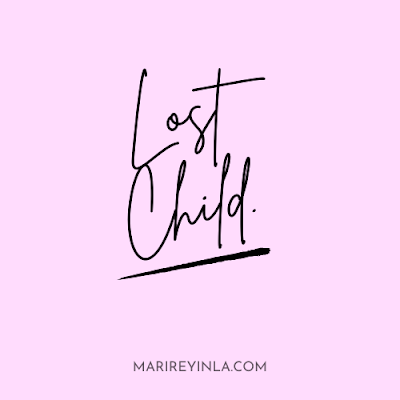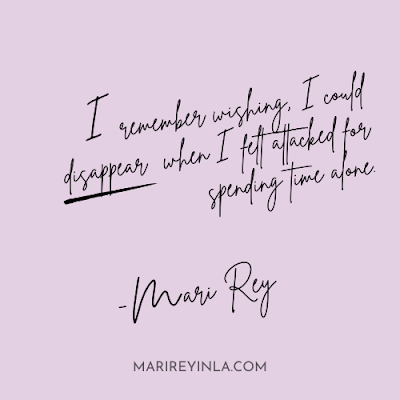Lost Child
My mother has always rejected the notion of Middle Child Syndrome. She would tell me it was an attempt by me to be dramatic and talk my way out of whatever mess I was getting myself into. Not only was I embarrassed that she did not believe me, but I felt misunderstood. When I approached her about feeling neglected and believing that it was because I was the middle child, she scoffed and told me to stop being dramatic.
I learned that
“acting out” and getting in trouble in school would get me the attention I
longed for. Attention due to bad behavior was better than none. While my father
struggled with his alcoholism for the first ten years of my life, my mother struggled
not only raising him, but five children that had different needs. She did a
great job providing us with the things our father felt short on, but it was
overwhelming. She juggled a lot of balls and as best as she tried, she could
not provide us with equal attention.
Whenever I
voiced a desire or want, she would be short with me. Granted some of my demands
were attention or ice cream. She would ask me to stop my rowdiness while she
was attending to the smaller children. When I wasn’t being rowdy, she would
dismiss me. I felt too much, I was too much for her to handle. I
was persistent, opinionated, and attention seeking which annoyed her. When she
would tell me to stop, I would become upset. I would tell her she was mean. She
would respond, “Stop being dramatic. I am doing something for your brother or
sister.”
It was this repeated narrative that stayed with me. I would eventually attempt to use being “dramatic” as an excuse for my misbehavior. The excuse only made my mother upset. The exposure to my father’s alcoholism and being a middle child wounded me. I was acting out because I felt ignored, misunderstood, and lonely. I had a shell of a father who rejected his children and a mother who was trying to manage the best she could and be strong for her five children.
Growing up with a set of siblings on either side of me made me feel misplaced. As we got older, there were times my older siblings excluded me from activities because I was too young. On the other end, I was too old to play with my younger siblings. This made me feel left out for a significant portion of my pre-teens. When I was at home, I spent a lot of time in my room listening to music. I would journal, read or collage. I remember wishing I could disappear when I felt attacked for spending time alone.
As I aged, I
slowly faded into the background. I learned how to live in a state of feeling
unimportant. When my mother would ask why I spent a lot of time alone I would
retort it was better than being yelled at for existing. This would upset her,
and she would repeat her catch phrase. I had a difficult time talking to my
mother about my feelings. She dismissed my big feelings as drama or a
misrepresentation of the truth. To this day, she argues that my account of
certain situations is incorrect. That I am distorting the truth.
It was through
therapy that I learned about the concept of the “lost child.” It explains why I
have always felt unloved or a sense of not belonging. It is at least a starting
point for the very chaotic childhood I had. There are other factors as well,
but I will focus on the lost child concept for now. In my adulthood, my mother has
expressed to me that she does not worry about me. She is confident that I will
always be okay, no matter the situation. It is a relief to hear, but also kind
of hard to accept.
Yet again, I
feel like I am being written off. Not
that she is doing so on purpose. I have been through a lot as a young adult and
have always managed to thrive. I learned from my mistakes, eventually, and kept
it moving. I did not let the bad moments take center stage or take over my
thinking. Bad shit happens to all of us, but I must scrape the shit off my
shoes and keep moving. However, a part of me believes that I have made it too
easy for my parents not to worry about me. While they were tending to my other
siblings, I grew up. I figured things out on my own, survived a lot of stuff
they do not know about, and have still managed to have a good head on my
shoulders.
I suppose, I was
forced to be okay.
It has taken
decades to have honest conversations with my mother about my feelings. In my
past attempts, I did not have the tools to discuss my feelings without
exploding when I was dismissed. I was told that I was making up Middle Child
Syndrome and was using it to get attention. The lack of compassion for my
feelings brought up the rooted hurt from my childhood.
When I went to college,
I took an interest in psychology, I even majored in the subject. I have always
had a fascination with human nature and growth. I wanted to learn more about myself
and my family dynamic. I remember coming home and trying to discuss things with
my mom and she would brush conversations aside. She was proud that I was in
school, but I think overwhelmed with the topic of conversation. I reflect on that
time and try to justify her dismissal of me as her not knowing how to have conversations
about emotions.
My parents have
always had tough honest conversations with their children about how dark the
world can be. They did not shelter us and prepared us the best they could so
that we would be able to manage the dark moments in our lives. Their tough love
approach made a lasting impact on their children; however, this tough love
approach also limited our ability to share our feelings with them and others. They
raised tough children that were stunted in their growth in different
areas, but we all struggle to express our feelings and snuffed out our inner
child.
It is only now in my thirties that I have been able to express my feelings and that my mother has been receptive. She has had a hard time listening to how I felt as a child and why I feel similarly as an adult. Feeling misplaced for most of your life takes a toll on you. What has been perceived as snobbish behavior or not caring is really me being at odds with my own emotions. When you feel overlooked it is difficult to let people in, despite the familial relationship.
I may not be a “lost
child” any longer, but I do feel unknown. There are times I feel that I only
matter when there is something major happening in one of my family members life
(the same for some “friends”). There are moments where I am needed to help
strategize or listen to a problem and then I fade into the background drifting out
to sea until someone needs me again.
Photo Credit: All pictures are Mari Rey Originals.




Comments